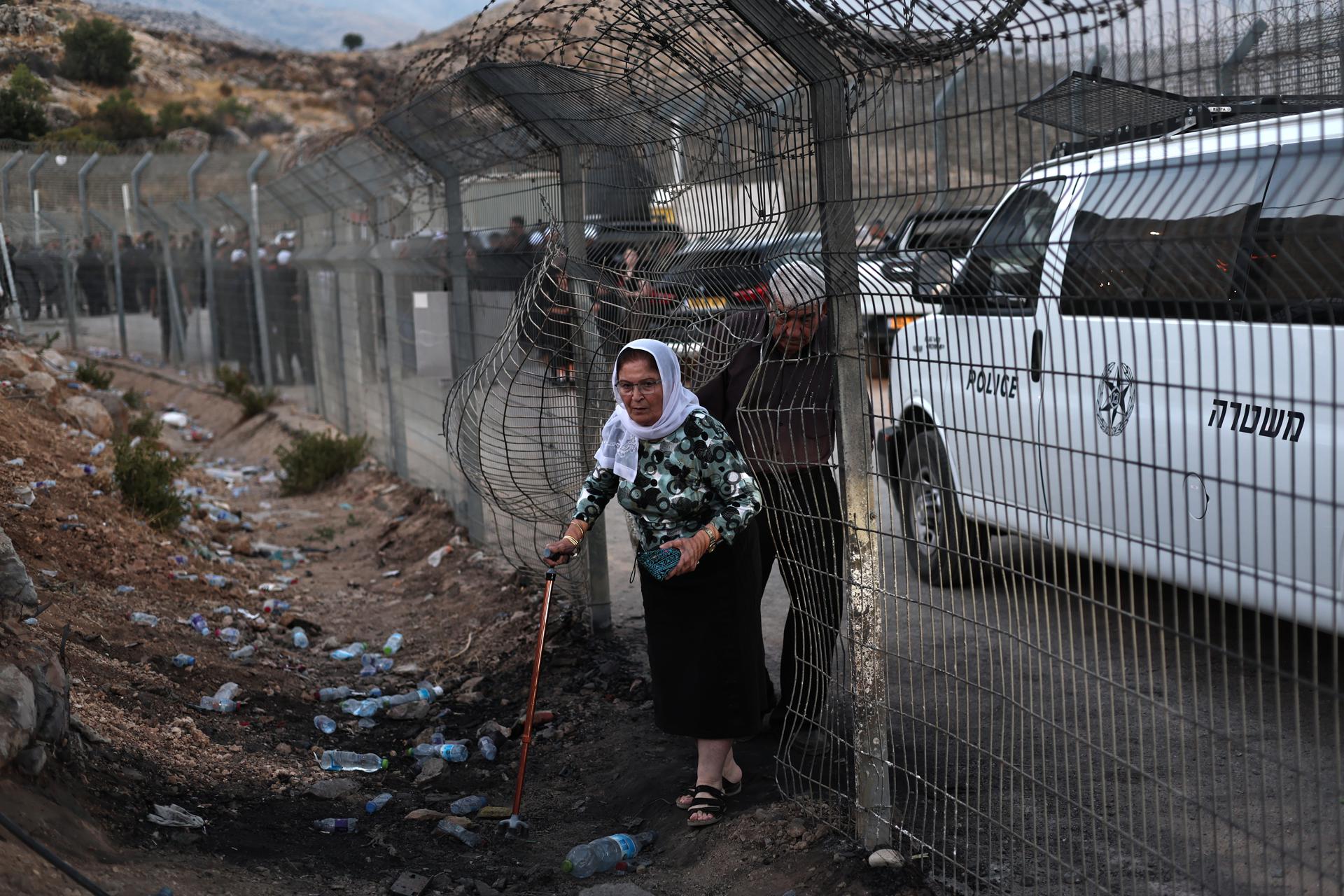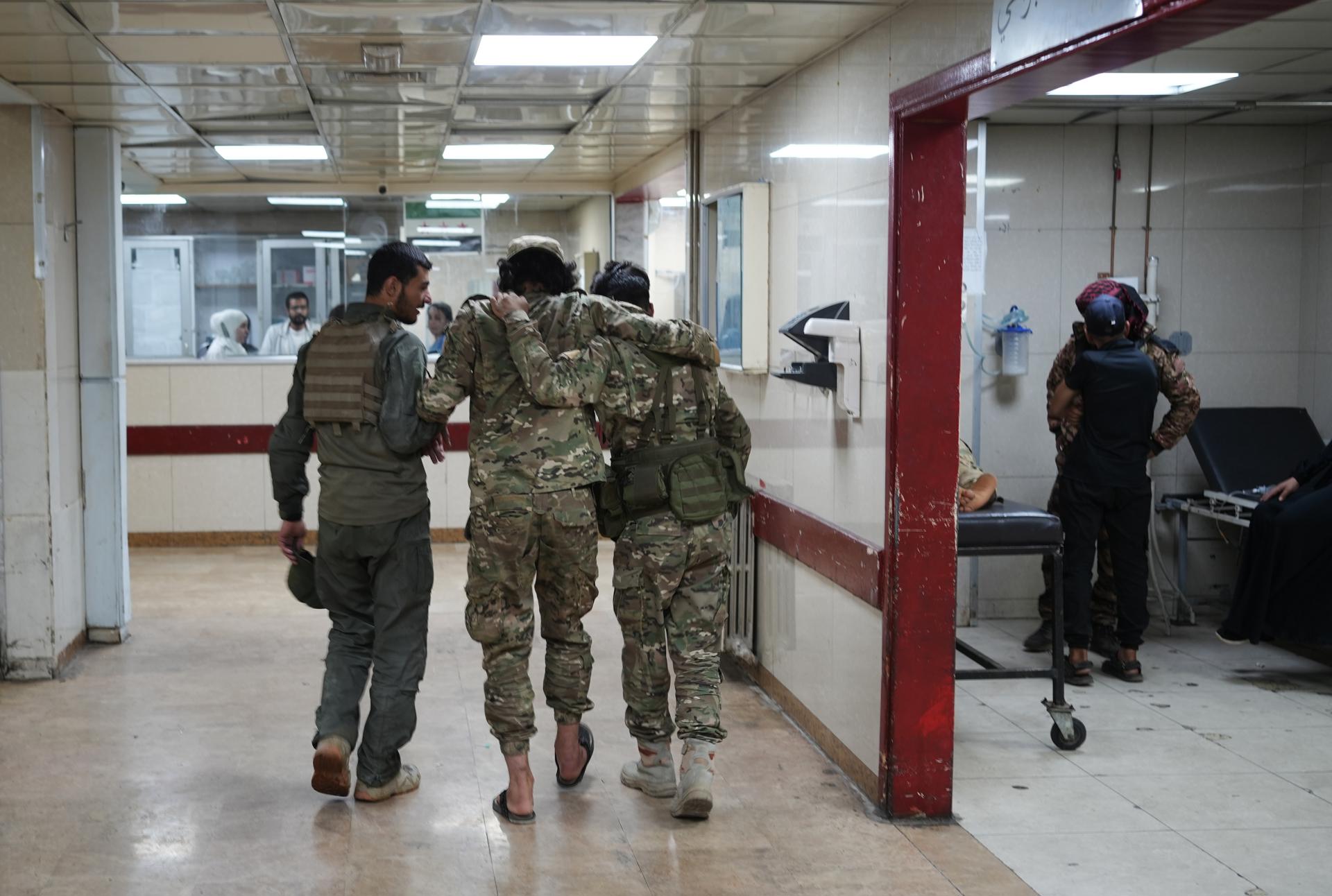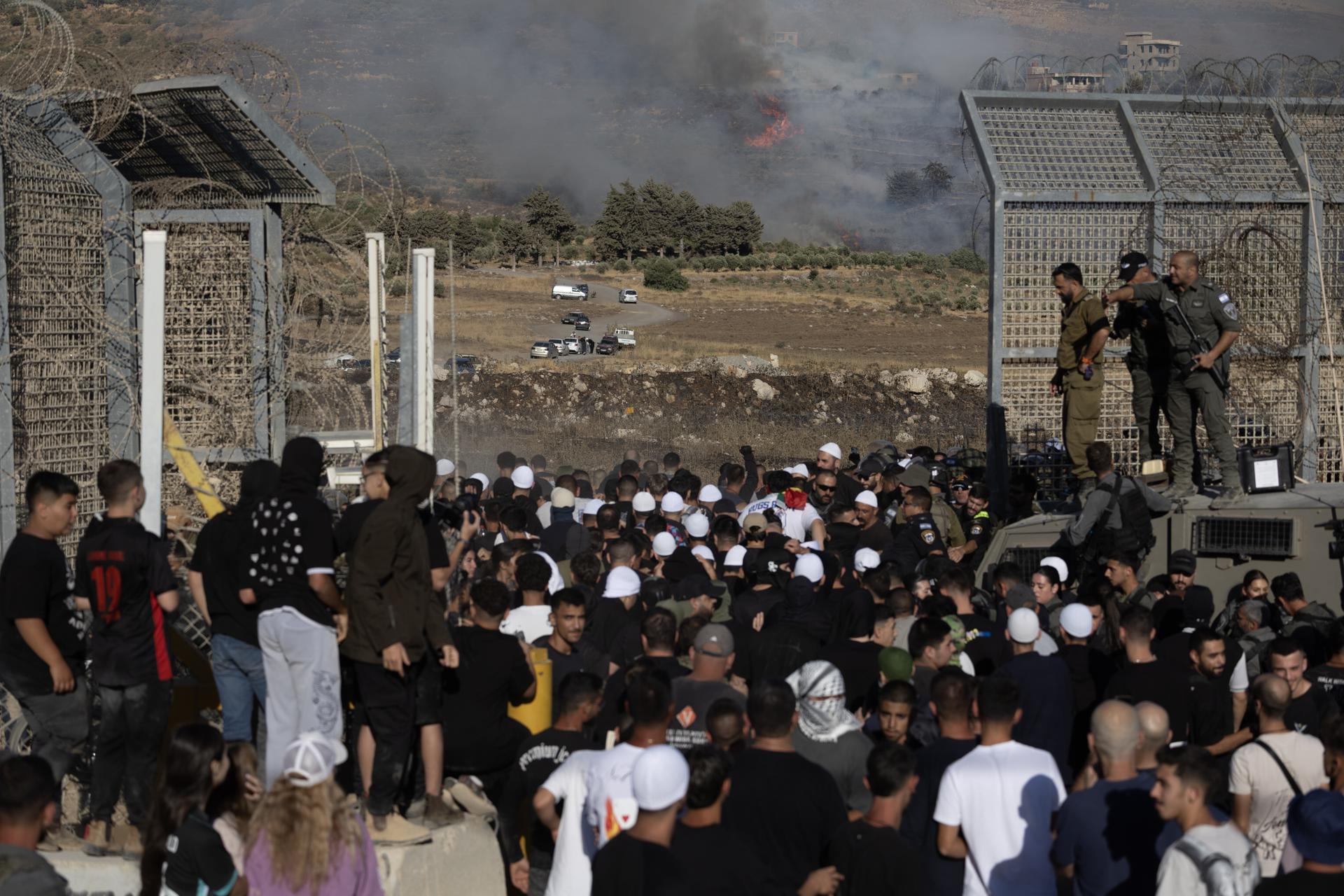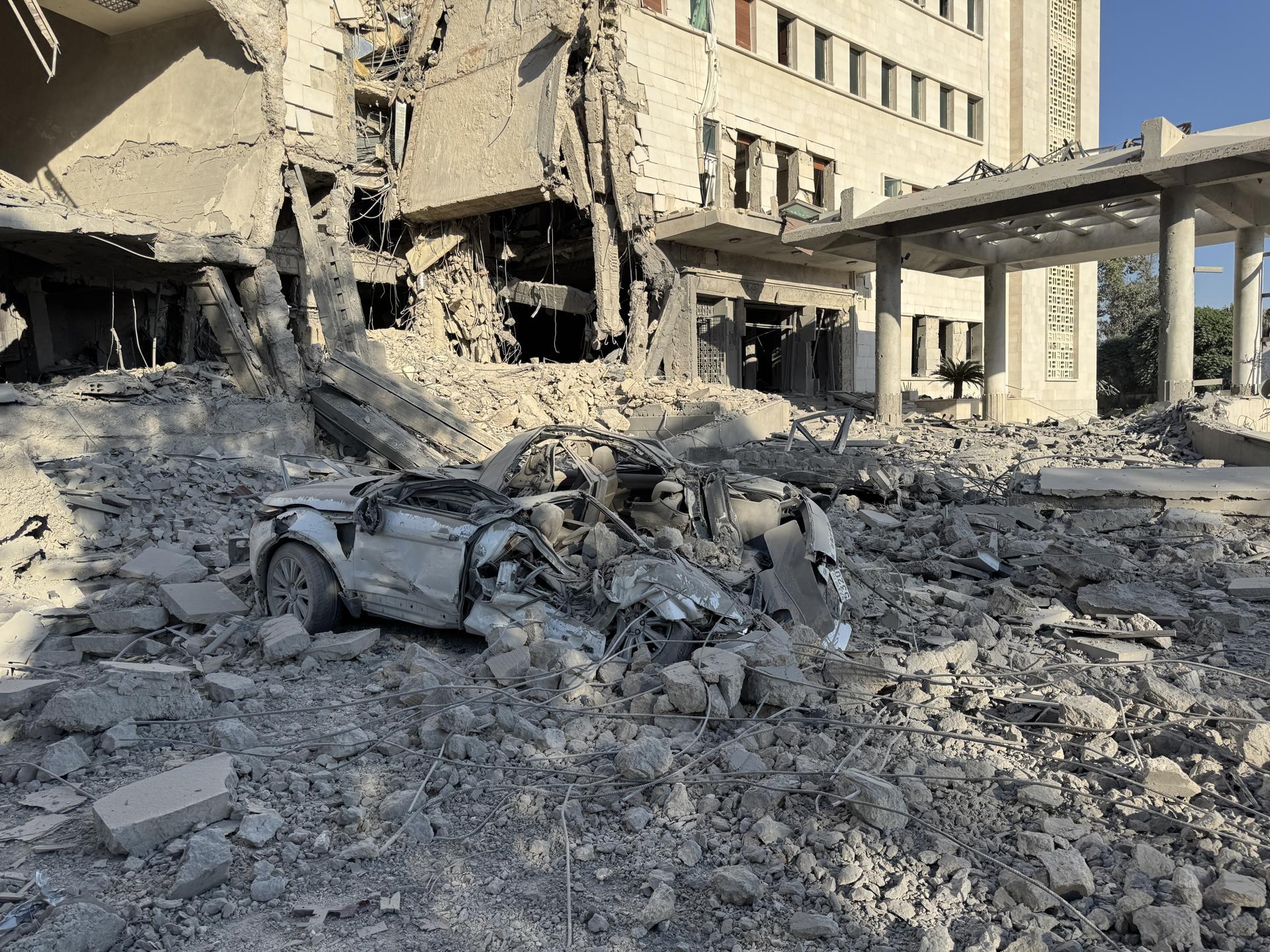Why did Israel bomb Damascus and pressure the Druze population despite US 'concern'? These are the expected scenarios.

Israeli airstrikes in Damascus, which hit the Syrian army headquarters on Wednesday, left at least three dead and 34 wounded , the Syrian Ministry of Health announced.
The Hebrew country's decision came after it threatened to intensify its attacks against government forces if they did not withdraw from Sweida, a predominantly Druze city in southern Syria where more than 300 people died in several days of violence.
Clashes erupted Sunday between Druze fighters and Sunni Bedouin tribes after the kidnapping of a Druze vegetable trader, which triggered a series of retaliatory kidnappings, according to the Syrian Observatory for Human Rights (SOHR).

People cross the border between Syria and Israel. Photo: EFE
Syrian government forces announced their intervention on Monday to stem the violence and were deployed on Tuesday to the city of Sweida, which until then was held by Druze fighters.
The OSDH, witnesses, and Druze groups accused security forces of numerous abuses, including summary executions of civilians and looting. According to this NGO , 300 people have died since the start of the violence, which prompted government forces to intervene. Most are combatants on both sides, as well as 40 Druze civilians, 27 of whom were summarily executed by government forces.
U.S. Secretary of State Marco Rubio said Wednesday he is "very concerned" about Israel's bombing of Syria and called for an end to the fighting.
"We are very concerned. We want the fighting to stop because we had a ceasefire last night that was broken again," Rubio said during a meeting in Washington with Bahrain's foreign minister.
The US Secretary of State added that he has held calls with the parties involved and that they are also "concerned." " We believe we are on the path to a true de-escalation ," Rubio stated.
These are the keys to the situation and what could happen.

A Syrian soldier is treated after being wounded in the Israeli attack. Photo: EFE
The Druze are a prominent minority in the Middle East, whose religion derives from Shia Islam . They are present in Lebanon, southern Syria, and the Israeli-occupied Syrian Golan Heights.
The Syrian presidency has promised to investigate the incidents and "punish all those" who commit crimes against the residents of Sweida, a Druze stronghold (despite being a minority in Syria), and for days there have been reports of attacks by armed men with alleged links to Damascus.
Local activists and residents have reported looting, degrading treatment, and the desecration of an Orthodox church in the southern village of Surah al-Kabira. Furthermore, both the Syrian Observatory for Human Rights and the local activist network AlSueida24 reported that more than 20 people were victims of extrajudicial killings on Tuesday following the arrival of government troops in the provincial capital.
As part of the escalation, the Israeli army has not only bombed vehicles belonging to the new Syrian regime in the vicinity of Sweida but also the capital, Damascus, where it attacked the vicinity of the Ministry of Defense and the Presidential Palace.

Damage to the Syrian Defense Ministry headquarters after the Israeli attack. Photo: EFE
Israel, which occupies and annexed most of the Syrian Golan Heights—home to a significant Druze population—has reiterated in recent days that it will not allow any military presence in southern Syria, near their shared border.
Israel exerts pressure on the Druze through a combination of economic control (water, land), bureaucratic constraints, and symbolic cultural integration initiatives , with the aim of turning the group into a loyal internal ally.
But what is of strategic benefit to the state provokes a reaction of rejection and feelings of alienation within the Druze community, and has generated growing tension with Druze communities more closely tied to Syria.
Who rules Syria and why is their control limited? The violence in Sweida illustrates the challenges facing Ahmed al-Sharaa's interim government since he and a coalition of Sunni rebel groups overthrew President Bashar al-Assad in December, in a country scarred by nearly 14 years of civil war.
The Israeli army followed through on its threat and carried out several bombings in Damascus on Wednesday, including at the entrance to the Syrian army headquarters in the heart of the capital, and announced that it had attacked a "military target" in the area of the presidential palace.
The Israeli military also announced it was strengthening its military presence on the Syrian border, where it had relocated some of its troops deployed in Gaza, and said it had identified "dozens of suspects" attempting to cross the border from Syria.

Dozens of Druze crossed the border in both directions. Photo: EFE
Dozens of Druze crossed the border in both directions on Wednesday, under tear gas from Israeli forces, an AFP correspondent reported.
Israeli Prime Minister Benjamin Netanyahu urged Israeli Druze not to cross the border.
What does the agreement announced by the United States consist of? After the United States envoy to Syria, Tom Barrack, called on "all parties" to "stand down" and the European Union urged "respect" for Syrian sovereignty following the Israeli attacks, the Donald Trump administration, which prioritizes de-escalation and dialogue as the main means to resolve the conflict, announced through US Secretary of State Marco Rubio an agreement with the parties to halt the conflict.
"We have reached out to all parties involved in the fighting in Syria. We have agreed to specific steps that will bring this troubling and terrifying situation to an end tonight ," the US Secretary of State detailed on social media.

Damage to the Syrian Defense Ministry headquarters after the Israeli attack. Photo: EFE
Against this backdrop, the United States urged the Syrian government on Wednesday to leave the conflict zone in southern Syria to ease tensions with Israel, which cited the clashes there as an attack on the army headquarters in Damascus.
"We urge the Syrian government to withdraw its military to allow all parties to de-escalate and find a way forward," State Department spokeswoman Tammy Bruce told reporters, without specifying the exact area of the withdrawal.
Earlier, one of the most influential Druze religious leaders, Hikmat al-Hejri, had appealed to Trump, Israeli Prime Minister Benjamin Netanyahu, "and all those who have influence in the world." "Save Sweida," he said.
"Our people are being exterminated and murdered in cold blood." The main Druze religious leaders have divergent positions, and Hejri distanced himself on Tuesday by calling on the minority fighters not to lay down their weapons.
The Israeli army said it is prepared for "different scenarios" in Syria. Photo: EFE
The Israeli military said it is prepared for "various scenarios, including in the coming days" in southern Syria, having mobilized troops from the Gaza and Lebanese fronts to the eastern border, an armed forces official confirmed.
The Israeli Army also confirmed that troops from the Northern Command (in charge of the Lebanese border) were diverted to the Syrian border. "The Chief of Staff ordered the reinforcement of intelligence, aerial surveillance, and troops on the border," the officer added.
eltiempo




%3Aformat(jpg)%3Aquality(99)%3Awatermark(f.elconfidencial.com%2Ffile%2Fbae%2Feea%2Ffde%2Fbaeeeafde1b3229287b0c008f7602058.png%2C0%2C275%2C1)%2Ff.elconfidencial.com%2Foriginal%2F781%2Fe82%2F877%2F781e82877db15140d3cb9e9497e0c25c.jpg&w=3840&q=100)
%3Aformat(jpg)%3Aquality(99)%3Awatermark(f.elconfidencial.com%2Ffile%2Fbae%2Feea%2Ffde%2Fbaeeeafde1b3229287b0c008f7602058.png%2C0%2C275%2C1)%2Ff.elconfidencial.com%2Foriginal%2Fda4%2F779%2F981%2Fda47799811dad44a590c72d98d9c0d3d.jpg&w=3840&q=100)